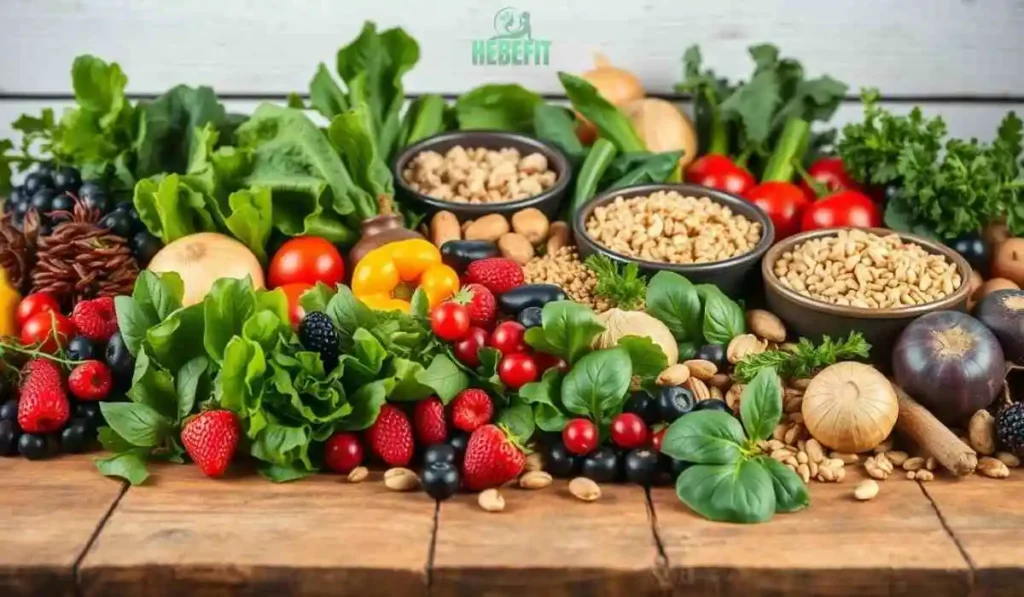Heart disease is the top killer in the U.S. But picking the right plants can change lives. Studies show a plant-based diet can cut heart disease risk by up 32%. This guide looks at how plants like berries, leafy greens and nuts help your heart.
They do this through natural compounds. Learn how to lower cholesterol, control blood pressure, and live longer with science-backed plants.

Key Takeaways
- Top plants for a healthy heart include berries, spinach, almonds, and beans.
- Plant-based heart health reduces critical risk factors like high cholesterol and hypertension.
- Cardiovascular plants provide nutrients like antioxidants and fiber that strengthen heart function.
- Natural supplements for heart health can be found in everyday foods like flaxseeds and avocados.
- Herbal remedies for heart health, such as turmeric and garlic, offer additional protective benefits.
Understanding the Plant-Heart Health Connection

Switching to a plant-based diet benefits for cardiovascular health by tackling high cholesterol and blood pressure. Plants have compounds that protect your arteries and boost blood flow. Let’s dive into how these nutrients help and what science says.
How Plants Protect Your Cardiovascular System
Plant-based proteins and antioxidants are your body’s natural shield. Antioxidants fight off free radicals that harm blood vessels. Fiber helps remove cholesterol from your body. For example, lowering cholesterol naturally with plant foods helps prevent artery blockages. Plant sterols also block cholesterol absorption, helping your heart without drugs.
The Scientific Evidence Behind Plant-Based Heart Benefits
Research shows a vegan diet impact on heart disease risk is significant. A 2023 review in the Journal of the American Heart Association found a 30% lower heart disease risk with a whole food plant-based diet for heart health. Clinical trials also show reducing blood pressure with plant-based eating can cut down on blood pressure meds. These studies prove heart disease prevention with plant-based nutrition is supported by years of research.
Key Nutrients in Plants That Support Heart Function
- Potassium: Keeps sodium levels in check to control blood pressure.
- Fiber: Lowers bad cholesterol and keeps blood sugar steady.
- Omega-3s (ALA): In flaxseeds, these fats fight inflammation linked to heart disease.
- Magnesium: Helps arteries relax, easing heart strain.
These nutrients work together. For instance, plant-based proteins from beans replace saturated fats, lowering artery risks. Eating these foods improves your heart health with every meal.
Best Plants for Heart Health: The Ultimate List
Starting a heart-healthy diet means knowing the best plants. Here’s a guide to the top foods that support heart health:

Leafy Greens for Optimal Heart Performance
Leafy greens like spinach and kale are key for heart health. They’re packed with nitrates and vitamin K. These nutrients help blood flow and keep arteries healthy. Eat 1-2 cups every day:
- Spinach: Rich in folate to reduce homocysteine levels
- Kale: High in antioxidants like quercetin to lower inflammation
- Arugula: Natural nitrate content supports healthy blood pressure
Berries and Fruits Rich in Heart-Protective Compounds
Berries and citrus fruits are vital for heart health. Their bright colors mean they’re full of antioxidants:
- Blueberries: Anthocyanins reduce artery-damaging oxidative stress
- Pomegranates: Juice has been shown to improve arterial function
- Citrus: Vitamin C strengthens blood vessel integrity
“Daily berry consumption can reduce heart attack risk by up to 34% in women over 40.” – Harvard T.H. Chan School of Public Health
Nuts and Seeds That Lower Cholesterol Naturally
Studies show nuts like walnuts and almonds can lower LDL cholesterol by up to 16%. Focus on:
- Walnuts: Omega-3 fatty acids rival fish oil benefits
- Flaxseeds: Ground varieties provide heart-protective lignans
Legumes and Their Cardiovascular Benefits
Legumes like lentils and chickpeas are great for heart health. They have soluble fiber that traps cholesterol. Don’t forget:
- Soy products: Tofu provides isoflavones linked to reduced arterial plaque
- Black beans: ½ cup daily can lower blood pressure readings
Add these foods to your meals. Try spinach salads with walnuts, berry smoothies, or lentil soups. They boost heart health and overall well-being.
The Power of Heart-Healthy Herbs and Spices
Heart-healthy herbs and spices are packed with powerful benefits for heart health. These plants offer concentrated benefits that can enhance a heart-protective diet. From garlic’s blood pressure-lowering allicin to turmeric’s anti-inflammatory curcumin, these heart-supporting herbs are essential in every kitchen.
| Herb/Spice | Active Compound | Key Benefit | Recommended Use |
| Garlic | Allicin | Reduces cholesterol and supports blood flow | Add raw or crushed to meals |
| Turmeric | Curcumin | Fights inflammation linked to heart disease | Cook with black pepper to enhance absorption |
| Cinnamon | Cinnamaldehyde | Helps regulate blood sugar and lipid levels | Use ½–1 tsp daily in food or tea |
| Ginger | Gingerol | Improves circulation and reduces clot risk | Steep in hot water for tea or add to stir-fries |
| Hawthorn | Flavonoids | Strengthens heart muscle and rhythm | Consult a practitioner for standardized extracts |
| Cayenne | Capsaicin | Promotes healthy blood vessel function | Use sparingly as a seasoning |
Start small when using herbal remedies for heart health and watch for how your body reacts. Mix dried or fresh herbs into your meals, or use capsules if cooking isn’t your thing. Always talk to a doctor before mixing with medications like blood thinners. These top cardiac plants are most effective when part of a larger heart-protective lifestyle—along with exercise and whole foods.
How Plant Compounds Work to Protect Your Heart
Plant compounds act like natural shields for your heart. Antioxidant-rich plant foods for heart health fight off free radicals that harm blood vessels. Foods like apples and grapes contain phytochemicals that reduce inflammation linked to heart disease.
These compounds, including broccoli’s sulforaphane, block inflammatory pathways. This helps protect your arteries from damage. Leafy greens, beets, and bananas are good for your heart too. They help relax blood vessels and balance blood pressure.
- Leafy greens (kale, spinach) supply magnesium to relax blood vessels.
- Beets and bananas deliver potassium, counteracting sodium buildup that raises pressure.
- Flaxseeds contain lignans that activate genes lowering arterial plaque formation.
Plant sterols role in heart disease prevention is key. Foods like almonds and Brussels sprouts have sterols that block cholesterol absorption. Adding fiber-rich diets and heart disease reduction helps too. Soluble fiber in oats and beans traps cholesterol, helping it leave your body.
Studies show that sterol-fiber combos can be as effective as statin drugs. Omega-3s from chia seeds and walnuts balance blood lipids. Phytochemicals role in cardiovascular protection also includes nitrates in arugula, which widen blood vessels.
These natural mechanisms work together. They repair damage at a cellular level, without synthetic additives. It’s like nature’s pharmacy, healing your heart naturally.
Creating a Heart-Focused Plant-Based Meal Plan
Starting your heart-healthy plant-based meal plans is easy. Choose whole foods like oats, spinach, and walnuts. These foods are great for a plant-based diet good for the heart. You can follow a 30-day plant-based diet plan or make changes slowly. These tips will help you on your journey.
Breakfast Options for Cardiovascular Support
- Overnight oats: Mix rolled oats with almond milk, add chia seeds and mixed berries. Berries and oats help lower bad cholesterol.
- Green smoothies: Blend spinach, banana, and plant-based protein powder. Add turmeric for extra health benefits.
Heart-Healthy Lunch and Dinner Ideas
For balanced meals, mix grains, legumes, and veggies:
- Kale salad with quinoa, chickpeas, and roasted sweet potatoes (top with tahini dressing).
- Lentil curry with brown rice and steamed broccoli.
Smart Snacking for Heart Health
| Snack | Benefits |
| Apple slices with almond butter | Combines fiber with heart-healthy fats. |
| Roasted edamame | Rich in protein and folate. |
| Dark chocolate (70%+ cocoa) | Flavonoids improve arterial function. |
Use a plant-based diet food list of items like flaxseeds and avocados. Adjust your portions based on how active you are. If you have dietary restrictions, talk to a nutritionist. Small changes can make a big difference in your transitioning to a plant-based diet for heart health. Find new heart-healthy plant-based recipes online or in books to keep your meals interesting.
Common Misconceptions About Plants and Heart Health
Sorting through plant-based diet myths and heart disease can feel overwhelming. Let’s clarify what science really says about comparing plant-based and omnivorous diets for heart health. Many ask, “do vegetarians have less heart attacks” or if a plant-based diet heart healthy? Here’s the truth.
- Myth 1: All plant foods are equally heart-healthy. Processed “plant-based” snacks like veggie chips often pack sodium and oils. Focus on whole foods like spinach, oats, and berries to maximize benefits.
- Myth 2: Plant-based diets lack essential nutrients for heart health. Pair legumes with grains for complete protein. Fortified plant milks and supplements address B12, while flaxseeds provide omega-3s.
- Myth 3: Only medications can reverse heart damage. Studies show can heart failure be reversed with plant-based diet? Yes—some clinical trials demonstrate reduced plaque and improved blood flow when paired with lifestyle changes.
“Epidemiological data shows vegan heart attack rates are 32% lower than omnivorous diets, but results depend on food quality,” states the Journal of the American Heart Association.
Research clarifies what are some common misconceptions about plant-based diets?: Heart benefits come from balanced, whole-food choices—not just eliminating meat. While comparing plant-based and omnivorous diets for heart health highlights advantages, individual needs vary. Prioritize education over extremes to build a diet that supports your unique cardiovascular goals.
Integrating Heart-Healthy Plants Into Your Daily Routine
Starting a plant-based diet doesn’t mean you have to change everything at once. Begin with small, easy steps. The American Heart Association suggests adding heart-friendly plants to your meals gradually. Try the plate method: fill half your plate with veggies at every meal. This simple change is good for your heart, say cardiologists.
Practical Steps for Daily Success
- Swap refined grains with whole grains like quinoa or oats in breakfast bowls.
- Try plant-based proteins: lentil soups or black bean tacos instead of meat.
- Keep frozen berries or pre-chopped veggies for quick dinners.
Adapting to life’s demands is part of plant-based cardiac care. When eating out, choose salads or extra steamed greens. Even small choices help prevent heart failure.
Preserving Nutrients in the Kitchen
Steaming or roasting keeps more nutrients than boiling, says the American Heart Association.
Try these methods:
- Steam broccoli or spinach to keep antioxidants.
- Roast Brussels sprouts with olive oil for flavor without losing health benefits.
- Sauté garlic and turmeric briefly to boost their health benefits.
Raw options like salads are great too. Pair them with lemon juice for a heart-friendly meal.
When Supplements Matter
Whole foods are key, but some supplements can help. Omega-3s from algae or magnesium-rich powders are good. Always talk to a healthcare provider before adding supplements like plant sterols or CoQ10. Remember, supplements alone can’t reverse heart disease. They should be part of a consistent diet plan.
Measuring Success: How to Track Heart Health Improvements
Switching to a plant-based diet can greatly improve your heart health. But how do you know it’s working? Start by keeping an eye on plant-based diet and triglyceride levels, blood lipid levels, and endothelial function. These signs show how your diet affects cholesterol, blood flow, and artery health.
- Blood tests: Check plant-based diet and metabolic syndrome progress with HDL/LDL ratios. Also, track plant-based diet and hypertension management with regular blood pressure logs.
- Endothelial function: Use at-home pulse wave tests to check artery flexibility. This is linked to plant-based diet and heart rate variability.
- Subjective signs: Feeling more energetic during workouts or recovering faster can mean better heart health.
Consider adding heart health supplements for plant-based eaters like algae-based omega-3s or vitamin B12. They help fill nutritional gaps. Remember, it takes 3-6 months of consistent eating before you see lab result changes, as studies by the American Heart Association show.
Work with your doctor to schedule follow-up blood lipid levels panels. Discuss trends over time. Use apps like MyFitnessPal or Cardiio to track your diet and heart rate. This shows how meals affect your health.
Regular check-ins with healthcare providers help you stay on track. Celebrate small victories, like needing less medication or stable blood pressure. This keeps you motivated on your journey.
Final Thoughts: Your Journey to Better Heart Health Through Plant Power
Your journey to a stronger heart begins with simple choices. Heart disease reversal is possible with plant-based nutrition. Studies show that plant-based diets lower heart disease risk by fighting inflammation and improving cholesterol and blood pressure.
Leafy greens, berries, nuts, and legumes are more than food. They are essential for heart health.
Small changes can make a big difference. Replacing sugary snacks with walnuts or adding spinach to meals can help. These actions support heart health and boost energy and focus.
Health, beauty, and fitness are linked when you eat plants. Foods like oats or avocado can lower heart disease risk. Even small changes can lead to a longer, healthier life. Start with a berry smoothie or a nut-based meal and grow from there.
Plant-based nutrition is a path to reclaiming your health. By choosing heart-healthy plants, you’re investing in a future with less heart disease and more vitality. Every bite is a step towards wellness, showing that nourishing your body with nature’s resources is the best self-care.
FAQs
What are the best plants for heart health?
For heart health, eat leafy greens like spinach and kale. Berries, nuts, seeds, and legumes are also great. These foods are full of nutrients and antioxidants that help your heart.
How can a plant-based diet improve heart health?
Eating plants can make your heart healthier. They are full of fiber, antioxidants, and healthy fats. These help lower cholesterol and blood pressure, reducing heart disease risk.
What nutrients should I look for in heart-healthy plants?
Look for fiber, omega-3s, potassium, magnesium, and antioxidants like vitamin C. These nutrients help keep your blood pressure and cholesterol in check, supporting your heart.
Can nuts really help lower cholesterol?
Yes, nuts are good for your heart. They have healthy fats that can lower bad cholesterol. Eating nuts like walnuts and almonds can lower heart disease risk.
How do legumes benefit heart health?
Legumes like beans and lentils are great for your heart. They are high in protein and fiber. This helps lower cholesterol and blood sugar, supporting your heart.
What role do herbs and spices play in heart health?
Herbs and spices like garlic and turmeric are good for your heart. They can lower blood pressure and improve circulation. This helps keep your heart healthy.
How can I start transitioning to a plant-based diet for heart health?
Start by adding more fruits, veggies, and whole grains to your meals. Try plant milk instead of dairy. Experiment with new recipes to find heart-healthy foods you like.
Are there any misconceptions about plant-based diets and heart health?
Yes, some think all plant foods are healthy or lack protein. But whole plant foods are better than processed ones. Make sure to eat a variety of plant proteins.
Can a plant-based diet help reverse heart disease?
Research shows a plant-based diet can improve heart health. It may even reverse some heart disease symptoms. But, results vary, so talk to a doctor for advice.
What is the role of micronutrients in plant foods for heart health?
Micronutrients like vitamins and minerals in plants are crucial for heart health. They protect against damage, reduce inflammation, and keep blood vessels healthy.










